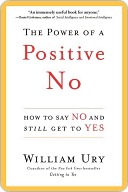
The Power of a Positive No
How to Say No and Still Get to Yes
کتاب های مرتبط
- اطلاعات
- نقد و بررسی
- دیدگاه کاربران
نقد و بررسی

January 1, 2007
Twenty-five years after the publication of the bestselling Getting to Yes
, Ury addresses the other side of the coin, but his version of "No" is not a simple rejection. "A Positive No begins with Yes and ends with Yes," he says, because it defines the nay-sayer's self-interests and paves the way for a continued relationship. Ury delineates this "Yes! No. Yes?" pattern recursively, so that each step is itself another three-part process. In addition to drawing on his own experiences as a negotiator for conflicts in countries like Chechnya and Venezuela, and the historical examples of activists like Rosa Parks, Nelson Mandela and Mahatma Gandhi, he shows how his principles can be used in the home and the workplace. He even throws in a few literary precedents, citing Melville's Bartleby the Scrivener
, whose repetition of the phrase "I would prefer not to" is cited as a "simple and admirable" method of polite refusal. Some of Ury's advice, like describing how another's actions make you feel rather than attacking the action, may strike the more cynical minded as touchy-feely, but his reminders to consider the other person's perspective while asserting your own position create a clear, unambiguous path to win-win situations.

Starred review from February 15, 2007
In a world rife with discord, Ury (Global Negotiation Project, Harvard Law Sch.) provides a much-needed voice of sanity and reason. Since 1978, his books have been helping the general public, businesspeople, and world leaders alike. Here, he flips the message of his "New York Times" best-selling "Getting to Yes", addressing those who have trouble saying no. Ury writes that many of us spend our lives submitting "to inappropriate demands, injustice, even abuseor we engage in destructive fighting in which everyone loses." All too often, he states, people accommodate, attack, or avoid. Ury shows how we can break that cycle by stepping away from negative emotions such as fear, guilt, and anger and finding the courage to say no. One of his more important points is that saying no doesn't mean you can't reach out to the person whose request you're denying and attain a compromise that will satisfy both sides. In this way, he helps us better understand ourselves and others. This work on an all-too-common problem should assist many; highly recommended for all public and academic libraries. [See Prepub Alert, "LJ" 11/1/06.]Mary E. Jones, Los Angeles P.L.
Copyright 2007 Library Journal, LLC Used with permission.

























دیدگاه کاربران